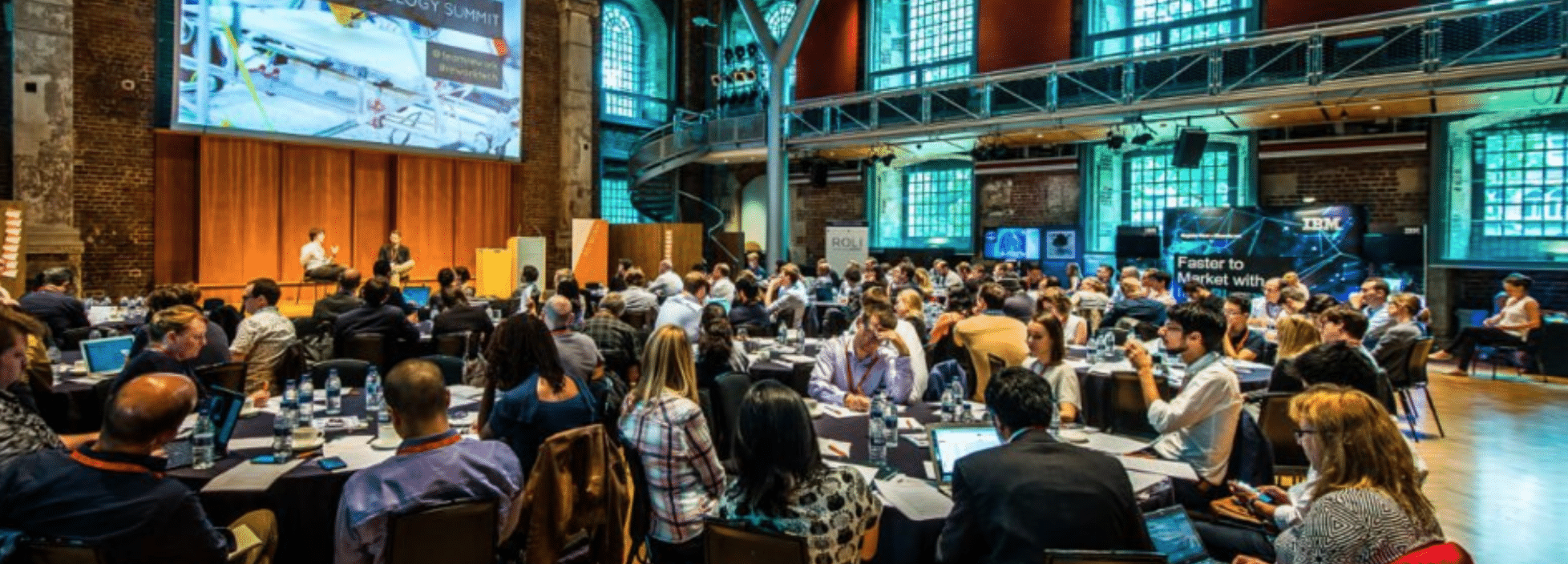
As interest in artificial intelligence has exploded in the last two years, the prevalence of AI-related events has followed suit.
Leaders across industries are developing an interest in where AI will impact their sectors, and what they should be doing about it now. In partnership with RE•WORK, we decided to get perspective on the value of networking and events from executives with experience both in business, and in hard science of AI.
Our interviewees for this article – Tom Wilde, CEO at indico, and Daniel Golden, Director of Machine Learning at Arterys – are speakers at the RE•WORK Deep Learning Summit & Deep Learning in Healthcare Summit on May 24 – 25th in Boston, MA.
In this article we’ll aim to answer the following questions:
- – How can business leaders take away the most value from AI-related events?
- – What is the value of meeting other business leaders who are also exploring or trying to apply AI?
- – What should more business leaders understand about how to apply AI in their companies?
How to Make the Most of AI Business Events
Curiosity might be what puts artificial intelligence “on the radar” for business leaders, but it’s probably not a good enough motive to spend time and money on attending an event. So what kind of motive would make it worthwhile?

Tom Wilde of indico believes that business leaders should have an understanding of both their near-term (6 month) and longer-term (~5 years) goals. That is, there should be priorities around impactful first steps for using AI, and there should be big-picture ideas about how the entire industry might transform, and what the organization should do to adapt.
Tom believes that having a wavering idea around time lines (near-term versus long-term) is probably a recipe for inaction:
“If you split the difference and try to average it out… you’ll find that you’re always 2 years away from trying something.”
The 6-month and 5-year lens might help attendees to go to sessions that are in line with the strategic direction of one’s company, as opposed to the sessions that seem “interesting.”
While Tom seems to imply that it’s best for business leaders to have these priorities in mind ahead of time – events might also be a good place for executives to develop a more realistic set of near and long-term priorities (or test the viability of their present plans and ideas).
As Tom sees it (and he’s far from alone in this opinion), business leaders need to rigorously get up to speed on AI for the sake of the future of their companies. He puts it this way:
“Your mission as an attendee is… you’ve got to become facile with machine learning concepts in the next 24 months, so that you then have the tools to know how it might apply to your business. That’s kind of the assignment.”
Arterys’ Daniel Golden points out that the main objective of event attendance will differ depending on the goals of the firm:
“It depends on the audience. It can be learning, PR, recruiting or sales.”
Companies looking to staff up on data science talent would likely want to attend events full of data scientists, while companies focusing on sales of an AI product might want to find the best opportunities
For events focusing on general AI education (“learning” events), Daniel states that “understanding the possibilities of AI” is among the most valuable take-aways for business leaders.
Indeed this general “understanding of possibilities” is the core incentive for business readers to visit our various pages. General “possibility”-oriented articles about AI in healthcare and AI in finance have been the most popular pages on our platform for years – with interest developing in increasingly niche sectors (from food services to entertainment and beyond).
The Value of Meeting Other Business Leaders Working on Artificial Intelligence Initiatives
Plenty of learning can be done online – but networking is much more conducive to meeting in-person.
I asked both Tom and Daniel for their perspective on what kind of networking might be useful for business leaders. Tom believes that getting an up-close view of real use-cases is where much of the value in networking lies:
“The reality is that it’s vital today because so few companies have implemented it, and even fewer have qualified the ROI… this cross-ed learning is vital in the coming three years.”
AI and machine learning are still “wizard skills” in terms of required technical prowess, and despite the noise and press releases – the fruitful (read: Have produced a positive ROI) use-cases of artificial intelligence are somewhat scarce. We’ve done our best to collect them (and we’ll continue to do so), but it’s clear that – across sectors – AI is inching it’s way into real business use, not yet leaping.
Hearing how businesses have actually applied AI is – in most industries – rather rare, and the ability to learn from managers and VPs who have that rare experience is what will help to proliferate AI to more industries. Tom states:
“…The more people talk about and understand it, the faster the adoption and better the project success ratio will become.”
Of course, savvy attendees should understand that most presenters of use-cases have some incentives to present a favorable story (for vendors: Displaying how easy their technology is and how well it works – and for business adopters: Showing how innovative they are – often in an attempt to attract talent). That being said, asking questions and examining use-cases along with the people who were part of making them happen is still rather useful, and (at least today) rare.
What More Business Leaders Should Already Know About AI
“Getting up to speed” about artificial intelligence is no easy task, but most of the AI consultants we’ve spoken to (see our interview with Dr. Charles Martin) can attest to the fact that businesspeople struggle to adopt AI – in large part – because they don’t understand it.
The question remains: What, specifically needs to be understood?

I asked Daniel and Tom to tell me the the biggest AI misconceptions that they see in business leaders today. My goal was to determine some key insights to help with the “getting up to speed” process – insights with the most utility in understanding the applications and implications of AI.
Daniel Golden replied from a healthcare perspective, echoing considerations about data management that we we’ve heard time and time again from healthcare AI founders:
“In healthcare, data out there is incomplete, can contain errors, and often fails to track patients across physicians and institutions. Data curation is much harder and more time consuming than people think; the healthcare system has not been designed to support ingestion of data at the scale that AI needs to perform well.”
He also included:
“Also, AI is much more than building an algorithm. The success of AI-based products also hinges on how the technology is delivered to the end user, and how the end user interacts with it. At the outset, you need to define what the system is going to do, how it will be used, and what can go wrong.”
Tom spoke more broadly about what AI can and cannot do (distinctions that often evade business leaders):
“What a lot of people miss is that AI is very good when you can really provide a desired outcome, and have examples of how you got to that outcome historically. It’s not good at discovering what you want to know. It’s good at mimicry, not at raw insight.”
I asked Tom to add a bit more color on this distinction by providing examples for our executive readers here at Emerj.
AI can be quite good at generating some insights from your data as a means of helping you define the problem and your outcomes. It still helps to have an end goal in mind.
“Let’s say you’re analyzing thousands of customer service interactions – from email, chat, and other channels. The question is: What are some of the themes and topics inside some of these interactions? And secondly, what kind of sentiment can we derive from these interactions? Is there unhappiness tied to a set of specific features and topics?
AI can be very good at that kind if analysis. This is what we call unsupervised exploration of the data. And the means of building a model that could take a new ticket and route it to the right department (the product team, for example).”
So while AI can help explore “clustered” commonalities in data, the task of ultimately making sense of those patterns and determining what a specific AI-based product should do within a company – is safely still the responsibility of humans.
Tom mentioned that at large companies, a board will ask an executive team “Is AI an opportunity or a threat?” This is a hard question to pin down, and implies a fundamental understanding around AI’s capabilities today. Tom mentioned the three major areas of focus when Indico speaks with a company’s leadership for a first encounter:
1 – What is AI good at, and what is it bad at?
2 – What are the core building blocks of success for AI? (data, defined outcomes, subject matter experts)
3 – A framework for determining ROI (How do we want to measure a “win” here?)
Thinking through those same topics is probably something that more and more executive teams will be forced to think through in the coming year.
About the RE•WORK Deep Learning Summit
RE•WORK’s Deep Learning Summit & Deep Learning in Healthcare Summit will be held on May 24 – 25th in Boston, MA. This year’s Deep Learning Summit will include speakers from Google Brain, Netflix, Amazon, and more.
Emerj readers can receive a 20% off discount from either event by using the code:
EMERGE20
Visit the Deep Learning Summit & Deep Learning in Healthcare Summit registration page to see the full agenda:
This article was written in partnership with RE•WORK. For more information about advertising and promotional services at Emerj, visit the Emerj Advertising page.
Header image credit: RE•WORK








